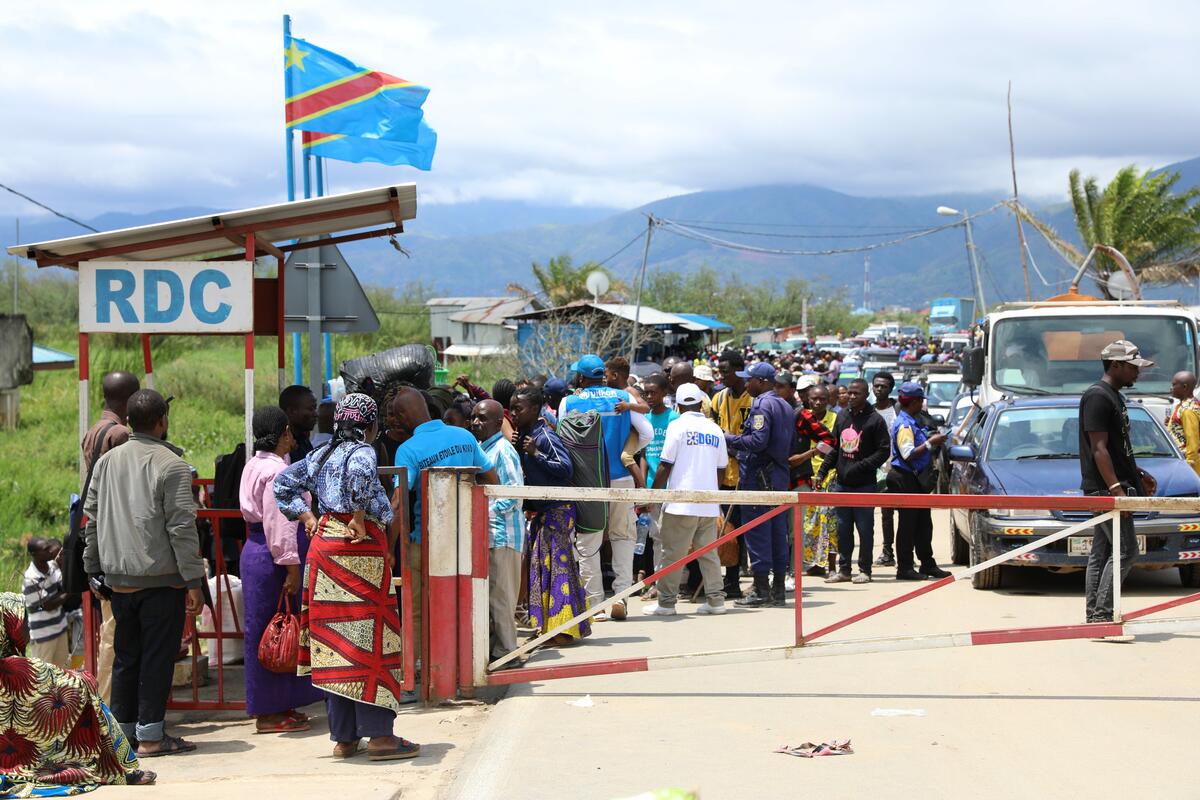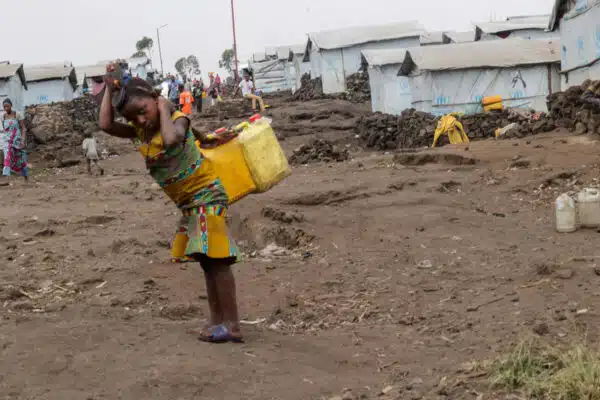
After fleeing escalating tensions and violence in eastern DR Congo’s Bukavu area, people wait to cross into Burundi at the Gatumba border post. © UNHCR/Bernard Ntwari
This is a summary of what was said by UNHCR spokesperson Matthew Saltmarsh – to whom quoted text may be attributed – at today’s press briefing at the Palais des Nations in Geneva.
GENEVA – Between 10,000 and 15,000 people have crossed into Burundi over the last few days, fleeing escalating tension and violence in the Democratic Republic of the Congo (DRC). Most of those arriving are Congolese, mainly from the Bukavu area in South Kivu province, where the situation continues to deteriorate. A smaller number of Burundian nationals have also returned to their country fleeing clashes.
People are mainly arriving at the Gatumba border post close to the largest city, Bujumbura, exhausted and traumatized, many separated from their families with little information on their whereabouts. Teams from UNHCR, the UN Refugee Agency, and its partners are present to ensure people arriving in search of safety receive the support they need as they await registration and further reception procedures.
There are also reports of thousands arriving through unofficial border points including along the Rusizi River near Rugombo, with reports of several individuals drowning. Conditions in the communities near the border are extremely dire, with a lack of shelter, water and sanitation facilities. In one location, an additional 10,400 people are currently sheltering in schools and a local stadium on the DRC side as they wait to be relocated to safer settlements further inland.
National authorities in Burundi, with UNHCR support, are verifying and screening new arrivals to identify those in need of international protection and informing new arrivals on available services. Once registered, refugees are relocated to transit centres, where UNHCR and its partners are providing life-saving supplies including food, clean drinking water and essential health services. However, overcrowding in transit centres, with some currently hosting up to four times their initial capacity, is becoming a major concern as resources continue to be stretched, heightening tensions among the arrivals.
In collaboration with the Government of Burundi, UNHCR and partners are working to ensure that refugees can access the assistance and protection they need. While we are making every effort to respond to this emergency, there is an urgent need for additional resources to meet growing needs.
The situation in the eastern DRC remains challenging, with recent clashes in South Kivu forcing more than 150,000 people to flee. At least 85,000 of these individuals are living in newly-created spontaneous sites for internally displaced people, where basic services such as water, shelter and access to health services are in short supply. At the same time, rapid support to provide basic services in the zones of return in North Kivu is urgently needed as an increasing number of displaced families – about 80 a day from South Kivu – make the journey back to their villages.
Aside from Burundi, the number of people fleeing DRC across borders since the start of the recent escalation of conflict has remained relatively low. However, UNHCR teams in neighbouring countries are preparing to assist as needed.
The new influx joins the 91,000 refugees and asylum-seekers Burundi currently hosts, mainly from the DRC, many of whom have been in the country for decades.
UNHCR is grateful for the generosity extended to those fleeing the latest clashes in the DRC and urges this solidarity to continue. We reiterate our call for an immediate end to hostilities in the DRC to prevent further harm to civilians and allow for lasting peace, and urge stronger efforts to ensure their safety and access to assistance.
For more information, please contact:
- In Bujumbura: Bernard Ntwari, ntwarib@unhcr.org, +257 69 91 80 00
- In Kinshasa: Hanson Tamfu, tamfu@unhcr.org, +243 825 257 774
- In Nairobi (regional): Faith Kasina, kasina@unhcr.org, +254 113 427 094
- In Pretoria (regional): Duniya Aslam Khan, khand@unhcr.org, +27 84 585 720
- In Geneva: Eujin Byun, byun@unhcr.org, +41 79 747 8719
- In Geneva: Olga Sarrado Mur, sarrado@unhcr.org, +41797402307
Originally published by UNHCR on 18 February 2025





